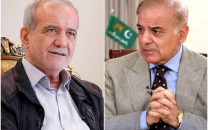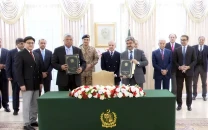Reko Diq legislation bulldozed through parliament
Mengal laments Balochistan's resources treated as 'spoils of war'

The Foreign Investment (Promotion and Protection) Bill, 2022, flew through the parliament on Monday as Senate and the National Assembly gave their approval for the bill guaranteeing protection for foreign investment in connection with the Reko Diq project.
As the sword of heavy financial penalties hanged on its head, the government moved with lightening speed and tried to solicit its allies’ nod but failed as BNP-Mengal and JUI-F opposed the bill in the lower house of the parliament while PPP Senator Raza Rabbani and National Party’s Tahir Bizenjo raised their hands in objection to the law when presented in the upper house of the parliament.
The ruling alliance, while apparently bulldozing the concerns raised by the allies, managed to put parliament’s rubber stamp on the bill on the grounds that the country could not afford to miss the December 15 deadline.
Law Minister Azam Nazeer Tarar, who recently resumed his charge, presented the proposed law in both houses, saying the prime minister has directed him to take everyone into confidence on the bill as it is estimated that 30 to 55 billion dollars would come to the country once the deal is signed.
Read more: ECC clears way to early start of Reko Diq project
Although the federal government recently got a favourable opinion from the Supreme Court on the settlement agreement for the Reko Diq project, more measures were required before the signing of the pact between Pakistan and Barrick Gold before the December 15 deadline.
The Sindh Assembly has already passed two resolutions in favour of the proposed agreements followed by the Balochistan Assembly passing a similar resolution. The bill had to be passed by the Senate and the National Assembly will pass before December 15.
In case the settlement agreement is not signed before December 15, the country will have to pay $4 million per day as interest on the $5.9 billion penalty imposed by the International Centre for Settlement of Investment Disputes (ICSID) on July 12, 2019. Similarly, Pakistan will also have to pay $100 million to the other complainant company, Antofagasta.
‘Balochistan to reap maximum benefit’
While pleading that the bill be passed without any amendment so that the deal could be saved, Law Minister Azam Nazeer Tarar said that it was the prime minister’s priority that Balochistan should reap the maximum benefit in the Reko Diq project. He added that Balochistan was going to get 35 to 40 billion dollars in thirty years.
Tarar revealed that the companies had sought a guarantee in the form of legislation regarding the Reko Diq project so that the project would not be affected.
Though the government failed to convince a few of its allies while passing the bill, the disgruntled allies pour their heart out and didn’t leave much to the imagination.
BNP-M’s Sardar Akhtar Mengal while expressing his views in the National Assembly said that bills are passed overnight for vested interests, saying the bill dealing with the fate of the country was presented in the parliament but even the lawmakers were unaware of what was in the bill.
Mengal said that no government has considered Balochistan as a part of the country but the province’s resources have been taken as "maal-e-ghanimat" (spoils of war) and its people have been considered "orphans". Emphasising that the constitution makes it clear that the province from where these minerals are found will have the first right to them, Mengal said people of Balochistan were currently being buried alive when they raise their voices for their rights.
Mengal regretted that the whole country progressed in the name of the China-Pakistan Economic Corridor (CPEC) as motorways and power projects were built across the country while Balochistan was deprived of the development of such development projects – not even a single road.
He regretted that the bill dealing with the future of the country was being passed in a hasty manner, adding that even the country’s top court did not examine the reasons that led to the previous court decision.
He went on to say that such legislation would not placate the people of Balochistan and recalled that has repeatedly cautioned that things would end up at the “point of no return” if this disregard persisted.
He even went on to say that the country should be converted into one unit if it has to go like this, saying then he will have no objections to such bills. BAP’s Khalid Magsi also reminded the government that it was because of their support that the government was doing legislation and lashing out at the previous rulers.
PTI protests
Meanwhile, PTI senators continued on Monday protesting over what they call the “illegal arrest” of one of PTI senators, Azam Swati, when the bill was sailing through the Senate. In NA, PTI has no force as 123 of its lawmakers had resigned en masse back in April when a no-confidence motion was successfully executed against the then PM Imran Khan. Since then, the empty seats of the National Assembly continue to chide the nation.
The house echoed with the slogans of PTI legislators and the opposition, asking for the release and issuance of production orders for Swati.
The former ruling party’s legislators gathered around Senate Chairman Sadiq Sanjrani’s podium and registered their protest, while the law minister presented the proposed law.
The security personnel had to be called in to control the situation.
In a brief address that was interrupted by protests, Tarar spoke about the importance of foreign investment in the country. “It is in everyone’s knowledge that the Reko Diq project came to a halt […] because of which Pakistan suffered several fines.”
As Tarar continued his speech Sanjrani repeatedly asked PTI senators — who had gathered around the minister — to take their seats.
“We will pass the production orders [of Azam Swati]. Don’t disrupt the quorum of the session,” he said, as PTI legislators continued raising slogans.
Sanjrani asked the house members if they had any objections to the bill to which PPP Senator Raza Rabbani and National Party’s Tahir Bizenjo raised their hands in objection to the law.
However, the legislation still went through as Sanjrani observed that the “Foreign Investment Promotion and Protection Bill, 2022, is adopted” and adjourned the session till Thursday.
Earlier, sources had said that Prime Minister Shehbaz Sharif had sought to allay the concerns of the ruling party’s ally, Balochistan National Party (BNP-Mengal), over the Foreign Investment (Promotion and Protection) Bill, 2022.
During a telephonic conversation with BNP-M president Sardar Akhtar Jan Mengal, PM Shehbaz sought the latter’s support over the legislation. However, Mengal informed the prime minister about the reservations of the Balochistan leaders over the bill, sources said.
‘Alliances keep breaking and forming’
Later, speaking outside the Parliament House, BNP president Sardar Akhtar Jan Mengal said that his party will not accept any agreement on the Reko Diq gold project which does not ensure 50 per cent profit for the government of Balochistan in.
Digging his heels in, Mengal said the alliances are constantly subject to changes, saying “coalition keep breaking and forming but we represent the people”. He asserted that this was a matter of usurping the rights of Balochistan, not merely that of Reko Diq.
“The right of ownership of the people of Balochistan should be recognised.”
He said a party meeting has been called after the revision of the legislation.
The bill
The Foreign Investment (Promotion and Protection) Bill, 2022, aims to protect investors from unnecessary court proceedings and other hassles.
The statement of objects and reasons of the bill says that to provide for the promotion and protection of certain qualified foreign investment and for matters incidental thereto it is expedient and in the national interest to attract, encourage, and protect, large-scale foreign investments into Pakistan.
It read: "To ensure sustainable economic activity and growth, it is necessary to improve the investment climate in Pakistan by way of providing incentives in direct and indirect taxes and ease of transfer and repatriation of foreign investments to the large scale foreign investment and by protecting such incentives from withdrawal and providing an expedient and efficacious mechanism to address grievances of investors of qualified investment."
"It is essential for the federal government, the provincial governments, the local governments and other relevant authorities to work together and cooperate to ensure the provision of incentives and protection for qualified investments."
In its verdict in the Reko Diq case last week, the Supreme Court had observed that the proposed bill would not only pave way for the implementation of the Reko Diq project in its present form but would also facilitate and encourage foreign direct investment in similar mining projects and other high capital intensive industries in which direct foreign investment was required to be encouraged through guarantees assured by laws and regulatory measures.
The top court said that the bill was not limited exclusively to the Reko Diq project, rather it provided a framework for the grant of investment incentives which, subject to the bill's provisions, would be available to all investments of $500m or more.



















COMMENTS
Comments are moderated and generally will be posted if they are on-topic and not abusive.
For more information, please see our Comments FAQ